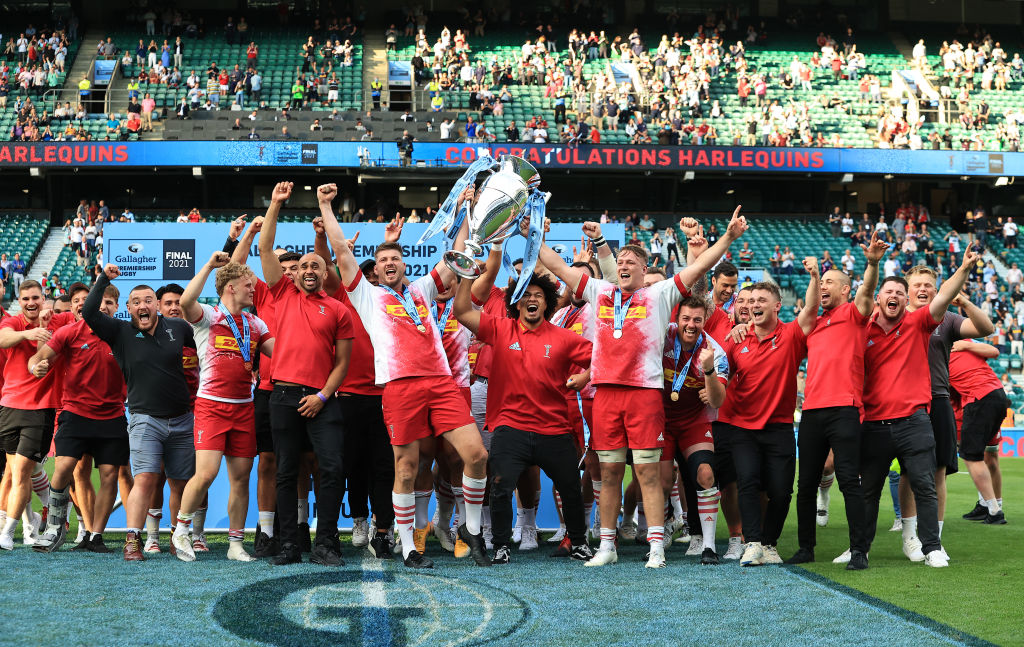Welcome to mad, mad world of modern rugby | Chris Hewett

LONDON, ENGLAND - JUNE 26: The Harlequins players celebrate with the trophy following victory during the Gallagher Premiership Rugby Final between Exeter Chiefs and Harlequins at Twickenham Stadium on June 26, 2021 in London, England. (Photo by David Rogers/Getty Images)
A single English Premiership campaign is an interesting bunch of competitions. We've been treated to old-style fights for the title in April, even if they were over by February; modern-day scraps for play-off places; hot races for European qualification; and last (so to speak) but by no means least, annual battles to dodge relegation.
Suddenly, we are in a very different place, where the keys no longer fit the doors. It is now harder to stay out of Europe than it is to find a way in – the opposite of Brexit, you might say – and even Alice might struggle to disappear down the rabbit hole into the parallel universe of second-tier Championship rugby now that the ring-fencers have prevailed. That hole has been filled in, maybe forever.
This is a proper upheaval: as mindaltering, in its way, as Michael Hooper turning in a poor performance for the Wallabies or World Rugby getting a grip on a sport it likes to pretend it controls.
All things considered, then, this is the most important Premiership season since the first one back in 1997-98, when the internet was young, Mark Zuckerberg was still in Middle School and a zoom call with a player meant phoning him illegally while doing 90 on the M4.
Strange to relate, given the current pecking order, the inaugural winners were a Newcastle side as dominant as any of the champions who followed them – 22 matches, 19 victories – while Bristol, a log-topping thrill a minute last term, managed just two wins all season and dropped a division.
The West Countrymen were good value for that demotion, finishing well adrift of London Irish in 11th spot but, in the years since, there have been as many desperate rearguard actions as there have been abject surrenders.
We may have had our share of Eurovision-style “nul points” moments – Rotherham drew a blank in 2001, London Welsh did likewise in 2015, and the likes of Bedford and West Hartlepool were equally barren, if only in the figurative sense – but there was no hint of horizontal pacifism when Harlequins copped the drop in 2005, or Northampton in 2007, or Newcastle five years later.
As for the “come one, come all” mayhem in 2003, when Bristol won seven games and drew another yet still landed bottom of a table in which half the Premiership finished within eight points of each other…that was the highest low in the 34-year history of the English league system. Unforgettable.
Events over the next few months will tell us for sure, but there is good reason to think we are losing an awful lot with the demise of relegation. The BT Sport commentators are pretty damned good almost all of the time, but they will find it easier selling sand to the Saudis than convincing us that a Gloucester-Worcester derby in late March adds up to more than the square root of sod-all if both clubs are 20-odd points short of the play-offs.
“Ah,” say the ring-fencers. “This is where you're flat-earth wrong.
Without the bumclenching jeopardy of relegation and the safety-first obsession that accompanies it, you'll see an explosion of running rugby.”
To which it is tempting to respond with a deafening “whoopeedoo”.
As Brian Ashton used to say in his days as England head coach: “Anyone – well, almost anyone – can throw a double cut-out switch pass behind his back in the last minute of a nothing game when no one cares if it works. The only question worth asking is if he can do it when it matters.” It is as good a point now as it was then.
And to cap it all, we have a rag-tag raft of World Rugby-sanctioned “experimental laws” as tantalising added extras. Can you hear those dull thuds drifting in on the prevailing south-westerly? That's Henry Slade and Joe Simmonds down there at Sandy Park, practising their 50-22 kicks and preparing us for even more Exeter tries from line-out mauls. The words “can't” and “wait” spring to mind.
There is nothing wild about the talk of this being a pivotal moment for the club game in England – and, indeed, for the sport in general, given the widespread frustration with so many aspects of it.
Despite the best efforts of Quins and Bristol and the razzle-dazzlers from New Zealand, the Union code is emerging from 18 months of lockdown-induced destabilisation as a flat, lustreless apology for itself. It is leaderless, shapeless, increasingly friendless and borderline joyless.
Which does not mean all is lost. There are a dozen things the governing class could do to spruce things up without staging further raids on what might loosely be called Rugby League's intellectual property – scrap- ping line-out lifting, insisting on straight feeds at the scrum, eradicating the jackal position – even before they set about identifying practical methods of ridding the sport of tactical substitutions, restoring British and Irish Lions tours to their former glory and restructuring the World Cup in a way that spares us the mindnumbing misery of endless mismatches.
A relegation-free Premiership is not obviously the ideal start so the onus is on the 13 elite clubs to prove otherwise. Over to you.
CHRIS HEWETT